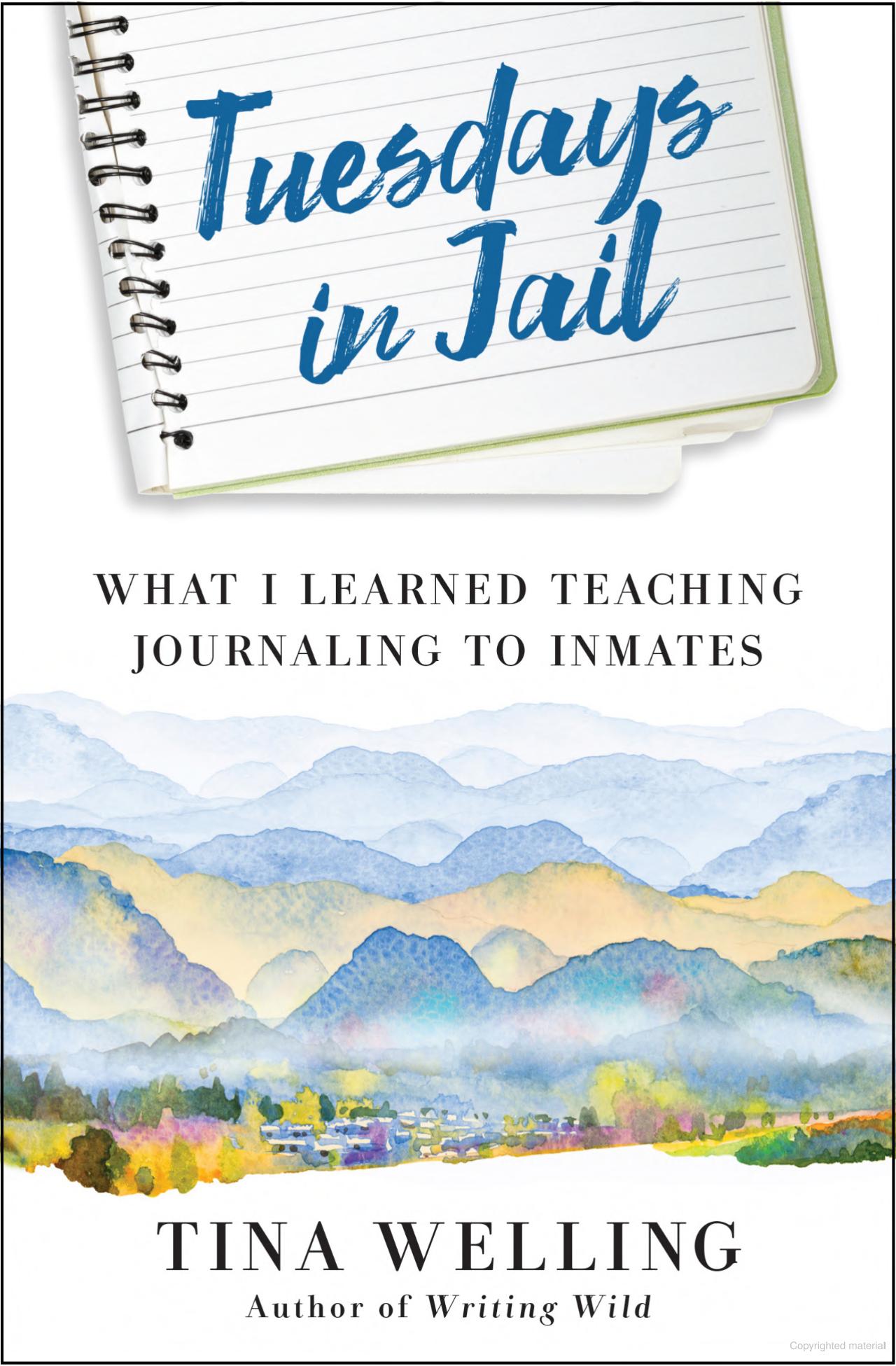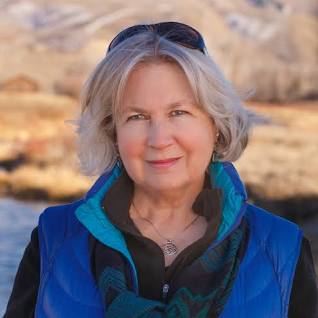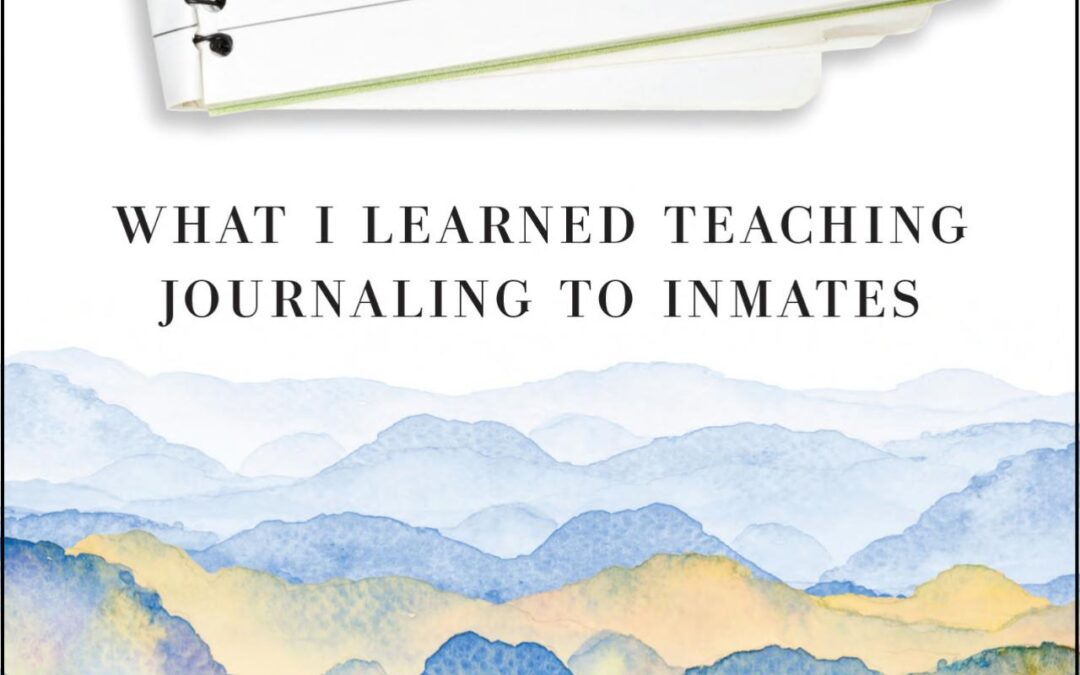I have written in a journal, on my own, for many years and I’ve written in community in various settings with others for a long time too. One setting in which I haven’t written with others is in a jail. We do have a jail in Nanaimo, B.C. where I live but the fear of being behind several locked doors prevents me from suggesting writing circles to the Nanaimo Correctional Centre.
Tina Welling has been going to the Teton County Jail in Jackson Hole, Wyoming, where she lives, since 2011 specifically to offer journaling workshops. She has written about her experiences including the insight she gained in her beautifully written book: Tuesdays in Jail: What I Learned Teaching Journaling to Inmates (New World Library, 2022).
 I pictured one room with a circle of chairs but that’s not how it was always set up for Tina’s Tuesday journaling workshops with the inmates. If in one room, there was an armed guard present and often two rooms were used that were adjoined by a metal grate. Tina also met inmates confined to maximum security, one on one, in a grated locked down room with no chance of physical contact. In that case, it was the only chance they got to talk to someone during the week.
I pictured one room with a circle of chairs but that’s not how it was always set up for Tina’s Tuesday journaling workshops with the inmates. If in one room, there was an armed guard present and often two rooms were used that were adjoined by a metal grate. Tina also met inmates confined to maximum security, one on one, in a grated locked down room with no chance of physical contact. In that case, it was the only chance they got to talk to someone during the week.
For people judged for their outward actions in the world, Tina gave the inmates a chance to examine their inner lives. As she said in an interview with her publisher: “Writing with pencil and paper engages the body, the mind, the emotions. Putting language to thoughts and feelings brings them from the unconscious where they can work us to our awareness where we can work with them.”
One of her own wise quotes is: “What we bring into the light, we can work with. What remains in the dark, works us.”
Tina spoke to the inmates on various topics including the abandoning of oneself and mentions a man called Isaac in her interview. “We discussed how easy it was to confuse generosity with giving ourselves over to others.”
In her book, Tina writes that she realized it was imperative for her personal growth that she spent time in solitude. That meant she would sometimes respond to social invitations occasionally by answering: “ ‘I have another commitment.’ And that meant a commitment to myself.”
The inmates were given small notebooks and small yellow pencils such as are used by golfers. Writing prompts designed and given by Tina were meant to help the inmates name their feelings and face them. If there can be an advantage to incarceration, as Tina says: “When all alone in a jail cell, a person can discover who they are when not defined by friends for work or reputation.”
While there was some discussion in the workshops about upcoming court dates for instance, the workshop focused on the emotional pain felt by the inmates. For many, violence was experienced in their early home life long before the inmates became the perpetrators of violence themselves.
The surprise that emerged over the years for Tina was that she and the inmates had a lot of characteristics in common. “It’s just that they had been arrested and I had not.” In the workshops they discussed “self-esteem, anger, forgiveness, compassion for ourselves and each other, personal power, co-dependency, and so much more.” Tina says she “went into the jail workshops and came out changed, every time.”
After several years of seeing inmates at weekly journaling workshops, Tina was seeing her “own issues, my own stopping places, or as Jungians call it, my shadow” reflected back to her. She asked an inmate called Gerald that she met alone with: “Would you say you abandon yourself in any way?”
A tear-filled session followed and when Tina was in bed that night she thought of the ways she had abandoned herself. “Not maintaining my boundaries, overriding my emotions, saying yes when I meant no.” She thought to herself the same words Gerald had said out loud: “Damn, journaling class is rough.”
Tina refers to several inmates she worked with and she describes her own “belly of the whale” period. During that time, she began “a lifetime spiritual practice;” she wrote “seriously;” and she “became a lover of the natural world.” These three are the “pillars” of her life now. When Tina began the journaling workshops, she didn’t really know herself she says, just like many of the inmates who attended them.
 On Tuesday evenings, through six locked doors in the jail, Tina Welling took her stack of index cards. Each card had a quote that could offer some-in-the-moment wisdom. She wanted to tell the inmates: “Your real life lies beneath your life situation.” She didn’t use the word “soul” but felt it was the soul of each inmate that she spoke to, “that core spiritual self.” The workshops took place in a situation, Tina feels, that the Sufi poet Rumi described: “Out beyond ideas of wrongdoing and rightdoing / there is a field, I’ll meet you there.”
On Tuesday evenings, through six locked doors in the jail, Tina Welling took her stack of index cards. Each card had a quote that could offer some-in-the-moment wisdom. She wanted to tell the inmates: “Your real life lies beneath your life situation.” She didn’t use the word “soul” but felt it was the soul of each inmate that she spoke to, “that core spiritual self.” The workshops took place in a situation, Tina feels, that the Sufi poet Rumi described: “Out beyond ideas of wrongdoing and rightdoing / there is a field, I’ll meet you there.”
Author Photo by Ryan Dorgan
Tina shares so much of her own wisdom and each chapter is a pleasure to read. She names the inmates who attended the journaling workshops and shares her own feelings and insight. Over seven years, Tina figures she saved thousands of dollars by not going to a therapist and rather working towards personal understanding in the journaling workshops.
In 2020, the jail was closed to the public due to the pandemic. Tina created a workbook of fifteen lessons each of which poses five questions. Some of Tina’s favourite quotes are included. I particularly like this one by Hafiz: “I wish I could show you / when you are lonely or in darkness / the astonishing light / of your own being.” The workbook is included in Tuesdays in Jail.
Tina also wrote a book entitled Writing Wild: Forming a Creative Partnership with Nature (New World Library, 2014) which I also highly recommend.
I want to say bless you Tina Welling for your work in the world and sharing your insights through your writing and the witnessing of uplifting sessions every Tuesday in jail.
If you’re curious about further approaches to journaling, I suggest checking out the International Association for Journaling Writing (IAJW). I’m on the Journal Council of the IAJW with a couple of my writing resources available for sale. A membership offers many perks including discounts on writing tools and courses. And there are many free resources too. Here’s a link if you’d like to check it out here.

